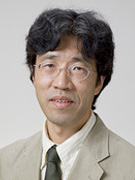Course of Human Sciences
Professor MIURA Kaname (Philosophy and Anthropology)
| [Theme] | Presocratic Philosophy |
|---|

I study the philosophy of ancient Greece, and my specific area of interest is Presocratic philosophy. Western philosophy is generally said to have been uncovered by Thales in 6th century B.C. Thus, it has a history that dates back over 2,500 years. The birth of the intellectual activity of philosophy is often seen as a "move from mythology to reasoning," and taken to be a declaration of withdrawal from myth-based forms of thought. In other words, the first to promote rational and universal knowledge about the universe were Presocratic philosophers like Thales. The objective of my research is to extract the essence of Presocratics, describe the influence that they exerted on the philosophies of Socrates and those who followed him (e.g. Plato, Aristotle, and the Stoics), and consider the historical significance of their thoughts.
You may wonder why it is relevant to study the works of these ancient philosophers. The philosophers of ancient Greece dealt with a number of issues. They grappled with questions related to the nature of existence, the source of knowledge, the idea of a "good life," the nature of happiness, as well as the meaning of the world and the universe─none of which have been answered definitively over the long course of history. These perennial questions continue to remain open as serious ones even today. Thus, in this way, it can be said that looking back at the origin of philosophy to gain an accurate view of the questions Presocratics raised, the line of logic that they followed, and the answers they derived is not simply trying to interpret the past from the present, but rather an effort to interpret the present through the past.
However, unlike Plato and Aristotle, the writings of Presocratic philosophers are scattered and have remained lost for ages, with no complete versions left. This means that the only option available to us for understanding their philosophy is the fragmentary quotations or indirect statements found in the works of authors of later generations. The process of using these few remaining fragments to reconstruct their thoughts and find out the true nature of their ideas is a difficult task, comparable to solving a jigsaw puzzle that starts off with missing pieces or even occasionally has pieces that do not fit. A single misstep could lead to flaws in the final picture. But, in reality, being faced with such challenges only makes the research of Presocratic philosophers much more appealing and stimulating.

